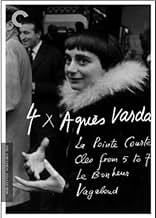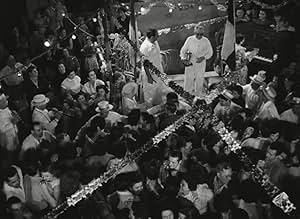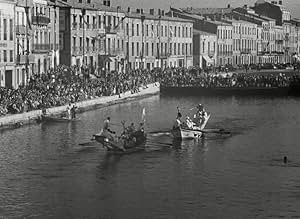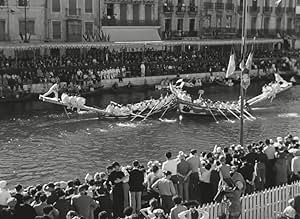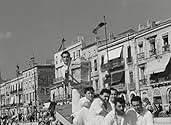IMDb RATING
7.0/10
4.7K
YOUR RATING
Follow the story of a couple who goes to a small French fishing village to try to solve the problems of their deteriorating marriage.Follow the story of a couple who goes to a small French fishing village to try to solve the problems of their deteriorating marriage.Follow the story of a couple who goes to a small French fishing village to try to solve the problems of their deteriorating marriage.
- Director
- Writer
- All cast & crew
- Production, box office & more at IMDbPro
Featured reviews
Agnès Varda began her career in 1954 as a feature film director with this movie that tells two separate stories in reciprocal counterpoint: daily life at a fishing village near Sète in France with its joys and dramatic moments and the relationship between husband and wife when she who is a Parisian returns to him after he had chosen to return to his birthplace where he feels now very happy but that doesn't seem to please her very much at first and puts their marriage in danger. This situation is given in a series of soft dialogues between them which don't reveal themselves deep and meaningful enough to make us feel the sentiments behind them. Varda has done much better later with such very good movies like "Le Bonheur" or "Cléo de 5 à 7". However this movie is also classified as a landmark in the New Wave of French cinema that began about that time with names like Truffaut, Godard and Chabrol. It's this historical value that mainly makes this movie worth to be seen.
Agnes Varda never got her just due for having made the first true film of the French New Wave. Part of it was because this picture didn't get much play at the time - even in France, but, a larger factor was that she wasn't as tight with the Truffuat and Godard Cahiers du Cinema clique who also got the first wide attention with films like 400 BLOWS and BREATHLESS. And, oh yes, she was a woman.
History aside, Varda's debut feature displays attributes associated with the Nouvelle Vague so prominently, that it is indeed a shame that she isn't properly credited.
The low budget shooting on the run, the elliptical dialogue between the lead couple (Philippe Noiret and Silvia Monfort) and the often off-kilter stylish compositions and editing. The score is largely a droning clarinet. It's all there in LA POINTE COURTE.
Varda's interest in photography which led to her career-long interest in Documentary filmmaking also marks the film, for the central romance shares time equally with a portrait of the tiny fishing community where it's set (the Noiret character's hometown). The ambitions of the film are small, but, it's still quite a low key delight. It should be better known and recognized as the true start of that famous French filmmaking Revolution.
I am not a film historian or a fan of Nouvelle Vague. I wanted to see this film because it gave me the opportunity to see my hero, Philippe Noiret, when he was just 26. Thankfully we began by watching the interview w/ Varda, which really gives you a solid understanding of why this film was/is so important, mostly having to do with it being so innovative for its time, and its place as an influence on filmmakers that followed. The 2 story lines did not engage or interest me really.But the visuals were often terrific. And oddly enough, we had just the night before, watched Clash by Night, an American film of the same time which was shot on location in the fishing community of Monterey CA. While visuals were often excellent there as well,in Clash by Night the film really was the STORY, and a very passionate one at that.
La Pointe-Courte was also really important as an example of one of the few important "First Films' of a director,especially a woman director in 1955 , and really especially, one who had no previous experience in film making and no knowledge of film history.
La Pointe-Courte was also really important as an example of one of the few important "First Films' of a director,especially a woman director in 1955 , and really especially, one who had no previous experience in film making and no knowledge of film history.
La Pointe Courte is a small jut of land on the east side of Le Canal de Sète, which connects L'Étang de Thau to the Mediterranean Sea. In the mid-1950s, it harbored a small fishing village (perhaps it still does, for all I know) which provides the setting for this film. Written and directed by 26-year old Agnès (née Arlette) Varda, this, her first and perhaps her best film, is credited by some film critics and historians as the first in the French New Wave.
A young (24) Philippe Noiret plays a native of the village who returns from Paris after many years for a short vacation. Heretofore, I was familiar with Noiret only with some of his much later films. Silvia Monfort, with whom I was previously unfamiliar, and who had one of the most unusual faces I've seen on film, plays the disillusioned Parisian wife who joins him five days later to discuss their marriage.
What's interesting about this film are its two intertwining parts. One part, shot in a familiar narrative style, concerns the everyday life and concerns of the villagers. The other part depicts the conversations of the couple in an artistic style full of fascinating images and interesting camera angles, a style which takes full advantage of Varda's photographer's eye. (Varda used three different cinematographers on this shoot, but I don't know which of them photographed which scenes.)
Varda chose the location for the film after a visit there for an assignment as a still photographer. What I liked best about the part involving just the couple were the slow pans of the environments, almost as if Varda were trying to capture the characters' surroundings in a series of stills. On the other hand, I found somewhat disturbing the obtrusive soundtrack of a clarinet, which went counter to the notion that a soundtrack is supposed to enhance the mood of the scene, not play against it as I found this to do. Perhaps that is part of what accounts for this being credited as a New Wave film.
A young (24) Philippe Noiret plays a native of the village who returns from Paris after many years for a short vacation. Heretofore, I was familiar with Noiret only with some of his much later films. Silvia Monfort, with whom I was previously unfamiliar, and who had one of the most unusual faces I've seen on film, plays the disillusioned Parisian wife who joins him five days later to discuss their marriage.
What's interesting about this film are its two intertwining parts. One part, shot in a familiar narrative style, concerns the everyday life and concerns of the villagers. The other part depicts the conversations of the couple in an artistic style full of fascinating images and interesting camera angles, a style which takes full advantage of Varda's photographer's eye. (Varda used three different cinematographers on this shoot, but I don't know which of them photographed which scenes.)
Varda chose the location for the film after a visit there for an assignment as a still photographer. What I liked best about the part involving just the couple were the slow pans of the environments, almost as if Varda were trying to capture the characters' surroundings in a series of stills. On the other hand, I found somewhat disturbing the obtrusive soundtrack of a clarinet, which went counter to the notion that a soundtrack is supposed to enhance the mood of the scene, not play against it as I found this to do. Perhaps that is part of what accounts for this being credited as a New Wave film.
10Red-125
La Pointe Courte (1955) was shown in the U.S. with its original French title. It was written and directed by Agnès Varda.
Although this was Varda's first film, she already had the uncanny knack of knowing how to film intensely personal moments, how to film small group discussions, and how to film crowd scenes. She wanted to write about the village of La Pointe Courte, but instead decided to make a movie. She borrowed money, and she made this movie. Clearly, she was a genius, and we can see that when we watch to film.
The acting in the film was at a high level. Most of the actors were nonprofessionals, who lived in the fishing village of La Pointe Courte.
However, the two leads: Philippe Noiret as Lui, and Silvia Monfort as Elle, were professional actors. (Although Noiret went on to become one of France's most popular actors, this was his first major role. Monfort was a professional who, by 1955, had already worked in theater and cinema.)
What makes the movie unique is that it blended one plot--an ethnographic vision of the small fishing village--with another very personal plot. In the latter plot, Noiret and Monfort play a married couple who have come from Paris to La Pointe Courte, where the husband was born. They are having an existential crisis. That always sounds pretentious, but I really think it fits in this case. Husband and wife are questioning their nature as individual human beings, their relationship as a couple, and whether they still truly love each other.
They rent a room in La Pointe Courte, and then they talk. (Remember, this is a French film--an early example of what became the French Cinematic New Wave . That means the couple don't kiss, they don't make love, they don't fish or swim--they talk about their relationship.)
Meanwhile, on the ethnographic side of the film, the people live hardscrabble lives because their income depends on the uncertainties of fishing. They are in a constant cat-and-mouse game with the public health authorities and the police, because they sometimes fish in contaminated water. As one character says, "Yes, the water is contaminated, but I haven't heard of anyone dying because they ate our fish."
The good news is that the villagers help one another. It's clearly a cooperative situation, and that's how they survive. However, their life is hard, and they're always one step away from disaster.
Philippe Noiret, even as a young man of 25, gives us the first view of the talent that he developed over the years. Monfort was his equal as an actor. She was 32 when the film was completed, but looked no older than Noiret. She had an unusual beauty, unlike the perfect beauty of Catherine Deneuve. In fact, Monfort looks like an actor Ingmar Bergman would have chosen to star in one of his films.
People have pointed out that some of the shots in La Pointe Courte resemble Ingmar Bergman's work. The fact is that Bergman's film Persona, which clearly has some similar shots, was completed in 1966, 11 years after Varda's film. My compliments to Bergman, who had the genius to recognize greatness in another director.
In many ways, the French Cinematic New Wave was a cooperative enterprise. The great director Alain Resnais was the editor of La Pointe Courte. Resnais had trained as an editor, but was already directing his own films in 1955. We can't tell how much his expertise helped fledgling filmmaker Varda, but my guess would be that his contribution was substantial.
We saw this film as part of an Agnès Varda retrospective in the wonderful Dryden Theatre at George Eastman House in Rochester, NY. It would be better to see it on the large screen. However, if that's not an option, see it on the small screen. This film is both an aesthetic pleasure and a movie of historical importance. If you love cinema, this film is a must!
Although this was Varda's first film, she already had the uncanny knack of knowing how to film intensely personal moments, how to film small group discussions, and how to film crowd scenes. She wanted to write about the village of La Pointe Courte, but instead decided to make a movie. She borrowed money, and she made this movie. Clearly, she was a genius, and we can see that when we watch to film.
The acting in the film was at a high level. Most of the actors were nonprofessionals, who lived in the fishing village of La Pointe Courte.
However, the two leads: Philippe Noiret as Lui, and Silvia Monfort as Elle, were professional actors. (Although Noiret went on to become one of France's most popular actors, this was his first major role. Monfort was a professional who, by 1955, had already worked in theater and cinema.)
What makes the movie unique is that it blended one plot--an ethnographic vision of the small fishing village--with another very personal plot. In the latter plot, Noiret and Monfort play a married couple who have come from Paris to La Pointe Courte, where the husband was born. They are having an existential crisis. That always sounds pretentious, but I really think it fits in this case. Husband and wife are questioning their nature as individual human beings, their relationship as a couple, and whether they still truly love each other.
They rent a room in La Pointe Courte, and then they talk. (Remember, this is a French film--an early example of what became the French Cinematic New Wave . That means the couple don't kiss, they don't make love, they don't fish or swim--they talk about their relationship.)
Meanwhile, on the ethnographic side of the film, the people live hardscrabble lives because their income depends on the uncertainties of fishing. They are in a constant cat-and-mouse game with the public health authorities and the police, because they sometimes fish in contaminated water. As one character says, "Yes, the water is contaminated, but I haven't heard of anyone dying because they ate our fish."
The good news is that the villagers help one another. It's clearly a cooperative situation, and that's how they survive. However, their life is hard, and they're always one step away from disaster.
Philippe Noiret, even as a young man of 25, gives us the first view of the talent that he developed over the years. Monfort was his equal as an actor. She was 32 when the film was completed, but looked no older than Noiret. She had an unusual beauty, unlike the perfect beauty of Catherine Deneuve. In fact, Monfort looks like an actor Ingmar Bergman would have chosen to star in one of his films.
People have pointed out that some of the shots in La Pointe Courte resemble Ingmar Bergman's work. The fact is that Bergman's film Persona, which clearly has some similar shots, was completed in 1966, 11 years after Varda's film. My compliments to Bergman, who had the genius to recognize greatness in another director.
In many ways, the French Cinematic New Wave was a cooperative enterprise. The great director Alain Resnais was the editor of La Pointe Courte. Resnais had trained as an editor, but was already directing his own films in 1955. We can't tell how much his expertise helped fledgling filmmaker Varda, but my guess would be that his contribution was substantial.
We saw this film as part of an Agnès Varda retrospective in the wonderful Dryden Theatre at George Eastman House in Rochester, NY. It would be better to see it on the large screen. However, if that's not an option, see it on the small screen. This film is both an aesthetic pleasure and a movie of historical importance. If you love cinema, this film is a must!
Did you know
- TriviaThis film is considered by many critics as the starting point of the French New Wave film movement.
- GoofsThe entire movie has been shot without sound and dubbed later, and it shows. At several points in the movie, the dialogue does not match the lip movements at all. For instance, early in the movie, when Jules' wife tells the other woman that it was Jules who scared the inspectors.
- ConnectionsFeatured in Great Directors (2009)
- How long is La Pointe Courte?Powered by Alexa
Details
Box office
- Gross worldwide
- $1,596
- Runtime
- 1h 21m(81 min)
- Color
- Sound mix
- Aspect ratio
- 1.37 : 1
Contribute to this page
Suggest an edit or add missing content


